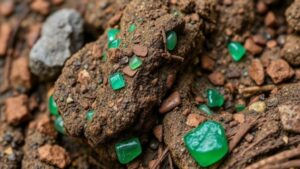How to Sell to Rock Shops: Building Relationships with Local and Online Vendors
How to Sell to Rock Shops: Building Relationships with Local and Online Vendors for Rockhounds and Mineral Collectors
For rockhounds and mineral collectors looking to sell their findings, establishing strong relationships with rock shops, both local and online, is key to ensuring successful transactions and ongoing partnerships. This article provides a comprehensive guide on how to effectively market your geological treasures to these stores and create fruitful relationships.
Understanding the Market
Before approaching rock shops, it is essential to understand the types of products that are in demand. Rock shops commonly seek a variety of items, including:
- Mineral specimens
- Cabs and tumbling stones
- Fossils
- Geodes
- Crystals and gemstones
According to the Gem and Mineral Show Association, the rock and mineral industry has seen a 7% annual growth over the past five years, indicating strong demand for unique and quality specimens. This growth is driven in part by the rising interest in hobbies centered around natural collectibles.
Networking with Local Rock Shops
Building relationships with local rock shops is an effective strategy for selling your materials firsthand. Here are several steps to guide you:
- Visit the Store In-person: Begin by visiting local shops to familiarize yourself with their inventory and customer base. This allows you to gauge what items are popular and desired.
- Introduce Yourself: Engage in conversations with the owners or curators. Share your passion for collecting and discuss your findings.
- Offer to Provide Samples: Bring samples of your rock or mineral specimens to showcase their quality. Make sure to include details regarding where they were sourced–geological information adds value.
- Learn Their Needs: Ask about the types of products they are interested in. Building a rapport can lead to better opportunities to understand their inventory needs.
For example, if a shop focuses on crystal healing, promoting crystals with documented metaphysical properties can meet their customers desires effectively.
Utilizing Online Platforms
Also to local vendors, online platforms can extend your reach and allow you to connect with shops around the globe. To optimize your online selling efforts:
- Choose the Right Platforms: Consider specialty marketplaces such as Etsy, eBay, and even Facebook Marketplace, as these platforms have a vast audience of rock and mineral collectors.
- Build a Professional Profile: Showcase high-quality images and detailed descriptions of your items. Use relevant keywords that collectors may search for.
- Engage with Online Communities: Join forums and social media groups dedicated to rockhounding and mineral collecting. Interacting with these communities can lead to valuable connections and potential sales.
- Use Online Auctions: Auctioning rare specimens can create a buzz and draw in serious buyers, often yielding higher prices than fixed listings.
A recent study conducted by IMARC Group reported that the global online jewelry and gemstone markets grew to USD 32 billion in 2022, highlighting the immense potential of selling gems online.
Creating Value through Education
One effective strategy to enhance your appeal as a seller is to educate potential buyers. This can include:
- Providing Detailed Specimen Information: Include scientific data such as mineral composition, locality, and color variations.
- Offering Care Instructions: Teach customers how to care for and display their items, which enhances customer satisfaction.
- Hosting Workshops: Organize informational sessions about mineral identification or proper cleaning methods. This not only positions you as an expert but also generates interest in your products.
By fostering an educational atmosphere, sellers can empower buyers, turning a simple sale into a relationship that encourages repeat business.
Maintaining Relationships and Following Up
Once youve established a connection with a rock shop or online vendor, it is crucial to maintain that relationship. Here are some best practices:
- Regular Communication: Stay in touch through emails or direct messages. Share any new findings, promotions, or information related to their inventory preferences.
- Request Feedback: After a sale, ask for feedback about the items sold. Understanding what customers loved or disliked can help tailor your offerings in the future.
- Offer Exclusives: Privately notify trusted vendors about newly discovered items or upcoming sales, enhancing their sense of partnership with you.
Consistent communication fosters loyalty, leading to long-term collaborations that benefit both parties.
Actionable Takeaways
To successfully sell to rock shops, local and online, you should:
- Research market trends to understand what items are in demand.
- Network with local rock shops and utilize online sales platforms.
- Create value through educating buyers about your products.
- Maintain and nurture relationships for long-term success.
By following these guidelines, rockhounds and mineral collectors can effectively connect with vendors, increasing their chances of selling their cherished finds while enhancing the appreciation of geological specimens in the market.


